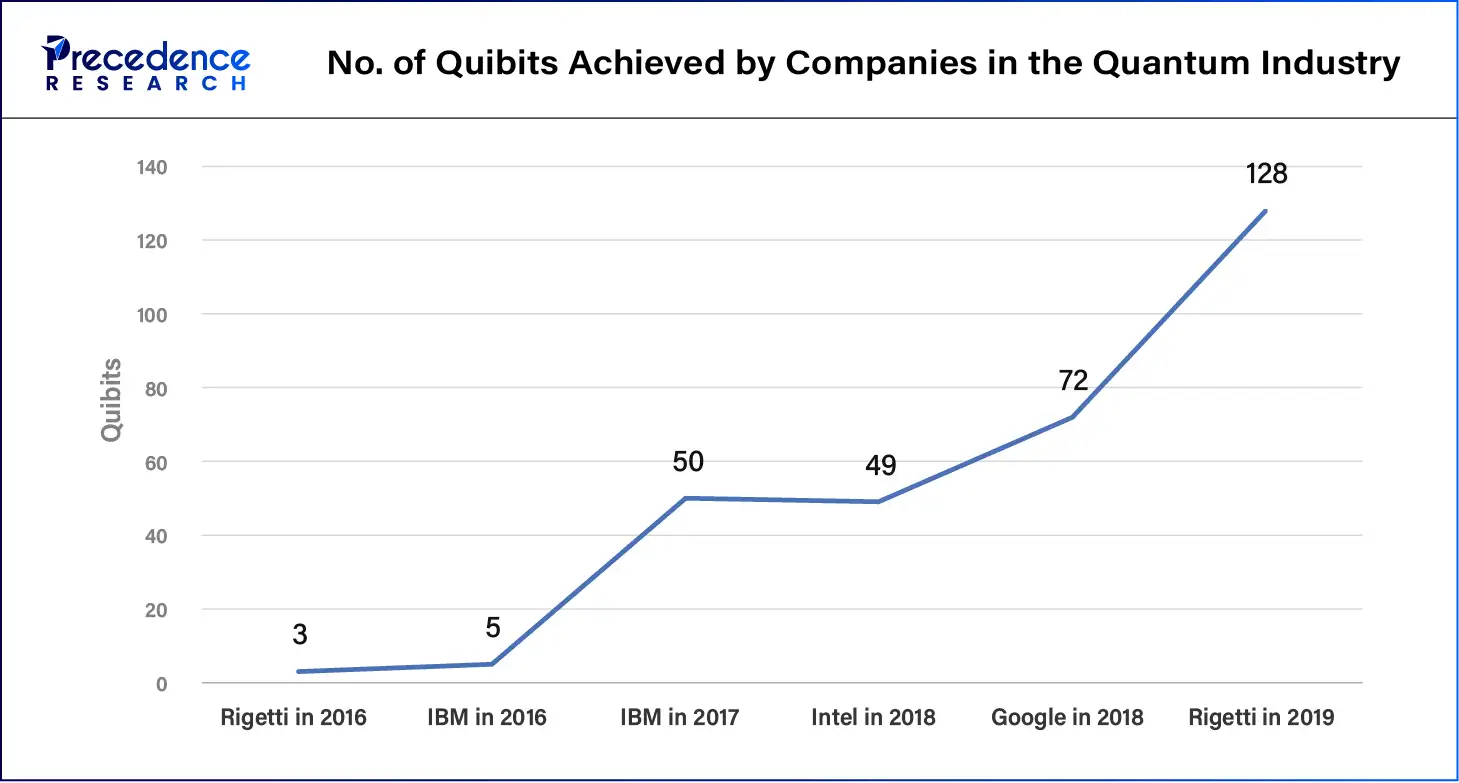- In December 2024, a leading tech company, Google, launched a highly advanced quantum chip named ‘WILLOW.’ Boasting unprecedented state-of-the-art performance, Willow upholds extreme capabilities of fast processing and withstands errors during computations. It represents the leading generation of quantum computing solutions, offering capabilities that exceed classical computational methods performed by existing computers.
The Quantum World
The quantum computing market involves a dynamic interaction between various stakeholders, the government, end-users, and individuals involved in related research. The global technological landscape stands at the brink of a revolution due to the power harnesses from quantum mechanics.
The rising demand for high-performance computing has led various sectors to adopt services provided by the quantum computing market. The market provides solutions to restraints in the traditional binary market. These include complicated processor designs, rising data center workloads, and demand for SaaS business models.
WILLOW: An Important Milestone?
Quantum networks have been facing issues related to discrepancies and instability since their genesis. WILLOW’s functionality positions it as a cornerstone in the market’s future development. As the sale of qubits increases, the chip can exponentially reduce errors and further stabilize the quantum systems. Willow is able to perform standard computations within 5 minutes only, which would originally take 10 septillion years even with the most advanced supercomputers.
Vision and Initiatives of Major Stakeholders
Due to the heavy investments and research ongoing in this field by major players like Microsoft, amazon, google, and IBM, the quantum computing technology market is expected to become a USD 1.3 trillion industry by 2035.
Progress of companies in the quantum industry

Rigetti Computing
Rigetti achieved quantum bits up to 128 in 2019. It has built and deployed integrated quantum computing systems with superconducting qubit technology, and it provides a cloud platform called Forest, which helps programmers write quantum algorithms. In 2025, Rigetti is looking to expand its cloud platform by partnering with NASA and the Department of Energy.
Intel
Intel, known for its semiconductor expertise, is exploring silicon-based spin qubits. Intel’s Tunnel Falls chip features 12 qubits and represents a step toward building more stable and scalable quantum processors. In June 2024, it unveiled its dual-chip system: Horse Ridge II. This marks a major advancement in overcoming the wiring limitation that hinders the scalability of quantum computing.
Google announced in 2019 that they achieved quantum supremacy in the context of solving problems that conventional computation methods cannot handle. In 2025, the Willow chip will be made to work on real-life challenges related to the material sciences, cryptography, and machine learning. Google is aiming to insert quantum systems into cloud services to establish itself as a leader in the quantum computing industry.
IBM
IBM unveiled a landmark new error-correcting code in 2024. This is 10 times more efficient than methods used to cancel out” decoherence. This new code set by IBM made a clear path toward running quantum circuits with more than a billion logic gates at one time. It is further planning to launch a quantum system with 200 logical qubits, able to run 100 million quantum gates by 2029, along with the aim to expand 2000 logical qubits, able to run 1 billion gates by 2033.
How is quantum computing shaping the human race and its future?
- The United Nations has announced 2025 as the international year of quantum science and technology, highlighting its potential to scale up in the near future.
- Geographically, the United States and China are leading the development of quantum technology at its full pace.
Revolutionization of the Technological Landscape
As a multidisciplinary sector encompassing several fields, including physics, mathematics, and computer science, quantum computing leverages quantum mechanics to address complex problems faster than traditional computing computers. Understanding and commercializing these interactions requires precision and a deep understanding. Engineers are experimenting with various qubit technologies to develop scalable quantum systems. These include trapped-ion qubits, superconducting qubits, and even more exotic options like topological qubits.
Researchers are now pushing artificial intelligence (AI) models to achieve new heights to test the limits of existing hardware and the tremendous demand for energy consumption due to rising applications of AI and ML models in diverse sectors. Quantum computers can investigate huge datasets from new angles and provide different pattern recognitions to get insights from them.
Quantum computing holds the promise to revolutionize various sectors in profound ways owing to its exponential speedup, increased data security, significant impact on AI and ML, potential contributions to scientific breakthroughs, and propelling human existence towards a bright future. A major factor that will shape the current market scenario is that the integration of a hybrid quantum-classical system seems to be a feasible solution that can bring practicality to this technology, making it commercially viable.
Multifaceted Applications of the Quantum Industry
Quantum-based decision-making is another trend that can be seen in 2025 owing to the ability of quantum optimization to withstand production-grade applications. The focus of quantum computing has shifted from innovations to real-world applications like data analytics to enhance the business decision-making process way faster than before.
In the pharmaceutical sector, the development of life-saving drugs is a challenging and time-consuming task to date as it encompasses tests of various biomolecules and their behavior. This is where quantum computing comes into play by simulating molecular behavior in many ways, and its response to various conditions could lead to exact solutions for any incurable disease, further propelling the pharmaceutical industry.
Similarly, in the chemical industry, quantum computers provide unidentified solutions to reduce destructive chemical by-products. Quantum computing helps to find better catalysts that enable better processes for carbon breakdown and aid in combating climate-threatening emissions.
Quantum computing can hold the potential to revolutionize the space industry in various ways through simulation and modeling in space science. Complex systems like galaxy formation, planetary formation, environmental changes, or materials for spacecraft cannot be easily replicated with traditional methods. However, by simulation with quantum computers, the exact core process of these intricate phenomena can be detected, which expands the research of deep space and its exploration beyond human limits.
Quantum computing also has a major impact on logistic management and route planning. Factors such as real-time traffic congestion, changing fuel prices, weather conditions, and the complex network of interconnected supply chains create an overwhelming array of possibilities. Although advancements in electric vehicles and alternative fuels provide some solutions, optimizing transportation routes continues to be a significant challenge.
Major Advantage of Developing Quantum Computing
The primary advantage of quantum computing is its ability to solve complex problems much more quickly than conventional methods, which could take millions of years, even with supercomputers. In addition to their speed, quantum computers are also more energy-efficient and produce lower carbon emissions compared to traditional computers. Although quantum computers require extremely low temperatures to operate and are primarily used for advancing research in specific fields, traditional computers are still necessary for performing simpler calculations and routine tasks
Quantum computers are expected to revolutionize fields that require immense computational power, such as cryptography, drug discovery, climate modeling, and optimization problems. Its computational power grows exponentially as more qubits are added, unlike classical computers. Most importantly quantum computers can process vast amounts of data simultaneously by exploiting the quantum state of qubits. This allows them to tackle problems that would be infeasible for classical computers.
A notable factor like increasing urgency to acknowledge cybersecurity challenges will likely drive the adoption of quantum-safe cryptographic solutions such as QKD and post-quantum algorithms. The National Institute of Standards and technology-NIST is working on a post-quantum cryptography standardization program aiming to develop quantum-resistant cryptography.
About the Authors

Aditi Shivarkar
Aditi, Vice President at Precedence Research, brings over 15 years of expertise at the intersection of technology, innovation, and strategic market intelligence. A visionary leader, she excels in transforming complex data into actionable insights that empower businesses to thrive in dynamic markets. Her leadership combines analytical precision with forward-thinking strategy, driving measurable growth, competitive advantage, and lasting impact across industries.

Aman Singh
Aman Singh with over 13 years of progressive expertise at the intersection of technology, innovation, and strategic market intelligence, Aman Singh stands as a leading authority in global research and consulting. Renowned for his ability to decode complex technological transformations, he provides forward-looking insights that drive strategic decision-making. At Precedence Research, Aman leads a global team of analysts, fostering a culture of research excellence, analytical precision, and visionary thinking.

Piyush Pawar
Piyush Pawar brings over a decade of experience as Senior Manager, Sales & Business Growth, acting as the essential liaison between clients and our research authors. He translates sophisticated insights into practical strategies, ensuring client objectives are met with precision. Piyush’s expertise in market dynamics, relationship management, and strategic execution enables organizations to leverage intelligence effectively, achieving operational excellence, innovation, and sustained growth.
Latest Blogs

Life Sciences Sector to Expand, New-Generation Trechnologies to Build Supportive Ecosystem
Life sciences aren't limited to only taste tubes, white coats, and microscopes nowadays. The study includes the smallest...
19 Dec 2025
Biopharmaceutical: From Transactional Procurement to Collaborative Innovation Ecosystems
The biopharmaceutical industry is undergoing a paradigm reconfiguration in how it conceptualizes and conducts R&D. A...
15 Dec 2025
Artificial Intelligence at the Core of Modern Industrial Transformation
Artificial Intelligence has moved from the periphery of enterprise innovation to the center of industrial transformation...
05 Dec 2025




 Request Consultation
Request Consultation

